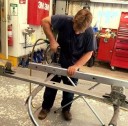The History of Automatic Parking
I remember the first time I saw someone use automatic parking to parallel park and I was shocked. Today, more and more cars have this feature and at Auto Craft Collision Center - Daphne, we are seeing more vehicles with it in Daphne, AL all the time.
Automatic parking is essentially an autonomous car-maneuvering system that directs a vehicle from a traffic lane safely into a parking spot to execute parallel, perpendicular or what is known as angle parking. The goal of the automatic parking system is to enhance the overall comfort and safety of driving in a constrained environment where much attention and experience is already required in order to steer the vehicle.
The parking maneuver is performed by means of coordinated control of the steering angle and the speed which takes into account the specific situation within the environment and current conditions to ensure collision-free motion within the space that is available.
One of the very first assistance systems for car parking was strictly manual. It utilized four jacks with wheels to raise the car up and then move it sideways into an available parking space. This system was proposed in 1934, but eventually died at the design stage for a wide range of reasons, mostly financial.
One of the world's initial experimental prototypes of automatic parallel parking was developed on an electric car called the Ligier at INRIA in the mid-1990s. The technology behind this version has been adopted by many of the main automobile manufacturers worldwide, that are offering an automatic parking option in their vehicles today.
Back in 1992, Volkswagen came up with automatic parking technology that uses 4-wheel steering in its IRVW (Integrated Research Volkswagen) Futura concept car, enabling it to move sideward for the purpose of parallel parking. However, no commercial adaptation of this technology was ever offered to the public. The idea of 4-wheel steering has been revisited in an all-electric vehicle ROboMObil of the German Aerospace Center. This car stops in front of an empty parking spot and re-orients its 4 wheels in a perpendicular direction to prepare for subsequent sideward action.
Then in 2004, a group of students at Linköping University began working with Volvo to develop a project vehicle known as the Evolve. The Evolve system can automatically execute parallel parking by calling upon a series of sensors and a computer to direct the steering, acceleration and braking of the Volvo S60.
Overall, automatic parking systems have been shown to enhance comfort and safety by reducing the level of stress that people will feel when that are manually steering for parallel parking and garage parking maneuvers.
Sources; Wikipedia, Motor Trend and Miami Herald









Social